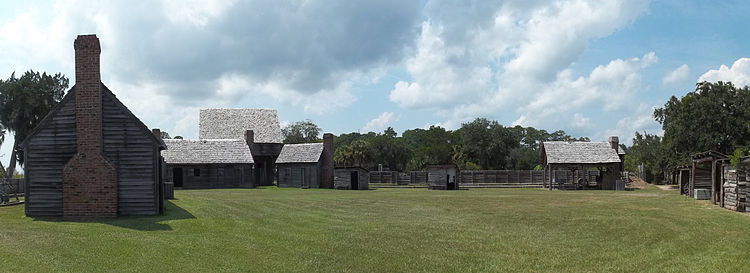Portal:Georgia (U.S. state)
The Georgia (U.S. state) PortalGeorgia /ˈdʒɔːrdʒə/ ⓘ is a state located in the southeastern United States. It was established in 1732, the last of the original Thirteen Colonies. Named after King George II of Great Britain, Georgia was the fourth state to ratify the United States Constitution, on January 2, 1788. It declared its secession from the Union on January 21, 1861, and was one of the original seven Confederate states. It was the last state to be restored to the Union, on July 15, 1870. Georgia is the 24th most extensive and the 8th most populous of the 50 United States. From 2007 to 2008, 14 of Georgia's counties ranked among the nation's 100 fastest-growing, second only to Texas. Georgia is known as the Peach State and the Empire State of the South. Atlanta is the state's capital and its most populous city. Georgia is bordered on the south by Florida; on the east by the Atlantic Ocean and South Carolina; on the west by Alabama; and on the north by Tennessee and North Carolina. The northern part of the state is in the Blue Ridge Mountains, a mountain range in the vast Appalachian Mountains system. The central piedmont extends from the foothills to the fall line, where the rivers cascade down in elevation to the continental coastal plain of the southern part of the state. The highest point in Georgia is Brasstown Bald, 4,784 feet (1,458 m); the lowest point is the Atlantic Ocean. Georgia is the most extensive state east of the Mississippi River in terms of land area, although it is the fourth most extensive (after Michigan, Florida, and Wisconsin) in total area, a term which includes expanses of water which are part of state territory.
Selected article -The Masters Tournament, also known as The Masters (sometimes referred to as The U.S. Masters outside of the United States), is one of the four major championships in professional golf. Scheduled for the first full week of April, it is the first of the majors to be played each year. Unlike the other major championships, the Masters is held each year at the same location, Augusta National Golf Club, a private golf club in the city of Augusta, Georgia, USA. The Masters was started by Clifford Roberts and Bobby Jones. Jones designed Augusta National with course architect Alister MacKenzie. The tournament is an official money event on the PGA Tour, the PGA European Tour, and the Japan Golf Tour. The field of players is smaller than those of the other major championships because it is an invitational event, entry being controlled by the Augusta National Golf Club. The tournament has a number of traditions. A green jacket has been awarded to the winner since 1949, which must be returned to the clubhouse after a year. The Champions dinner, inaugurated by Ben Hogan in 1952, is held on the Tuesday before each tournament, and is open only to past champions and certain board members of the Augusta National Golf Club. Beginning in 1963, legendary golfers, usually past champions, have hit an honorary tee shot on the morning of the first round. Such golfers have included Fred McLeod, Jock Hutchinson, Gene Sarazen, Sam Snead, Byron Nelson, Arnold Palmer, and Jack Nicklaus. Since 1960, a semi-social Par 3 Contest, on a par-3 course on Augusta National's grounds, has been played on the day before the first round of each Masters Tournament. Nicklaus has won more Masters Tournaments than any other golfer, winning six times between 1963 and 1986. Other multiple winners include Palmer and Tiger Woods, with four each. Gary Player, from South Africa, was the first non-American player to win the tournament in 1961. Since the course first opened in 1933, it has been modified many times by different architects. Among the changes: greens have been reshaped and occasionally rebuilt completely, bunkers have been added, water hazards have been extended, new tees have been built, hundreds of trees have been planted, and several mounds have been installed. Selected picture - Credit: USGS
The geography of Georgia describes a state in the Southeastern United States in North America. The Golden Isles of Georgia lie off the coast of the state. The main geographical features include mountains such as the Ridge-and-valley Appalachians in the northwest, the Blue Ridge Mountains in the northeast, the Piedmont plateau in the central portion of the state and Coastal Plain in the south. The highest area in Georgia is Brasstown Bald which is 1,458m (4,784 ft) above sea level, while the lowest is at sea level, at the Atlantic Ocean. State facts
State symbols:
Selected biography -James Longstreet (January 8, 1821 – January 2, 1904) was one of the foremost Confederate generals of the American Civil War and the principal subordinate to General Robert E. Lee, who called him his "Old War Horse." He served under Lee as a corps commander for many of the famous battles fought by the Army of Northern Virginia in the Eastern Theater, but also with Gen. Braxton Bragg in the Army of Tennessee in the Western Theater. Biographer and historian Jeffry D. Wert wrote that "Longstreet ... was the finest corps commander in the Army of Northern Virginia; in fact, he was arguably the best corps commander in the conflict on either side." Longstreet's talents as a general made significant contributions to the Confederate victories at Second Bull Run, Fredericksburg, and Chickamauga, in both offensive and defensive roles. He also performed strongly during the Seven Days Battles, the Battle of Antietam, and until he was seriously wounded, at the Battle of the Wilderness. His performance in semiautonomous command during the Knoxville Campaign resulted in a Confederate defeat. His most controversial service was at the Battle of Gettysburg, where he disagreed with General Lee on the tactics to be employed and reluctantly supervised the disastrous infantry assault known as Pickett's Charge. He enjoyed a successful post-war career working for the U.S. Government as a diplomat, civil servant, and administrator. However, his conversion to the Republican Party and his cooperation with his old friend, President Ulysses S. Grant, as well as critical comments he wrote in his memoirs about General Lee's wartime performance, made him anathema to many of his former Confederate colleagues. Authors of the Lost Cause movement focused on Longstreet's actions at Gettysburg as a primary reason for the Confederacy's loss of the war. His reputation in the South was damaged for over a century and has only recently begun a slow reassessment. Selected anniversaries for February
Did you know -
CategoriesSelect [►] to view subcategories
WikiProjects
What are WikiProjects? Selected panoramaCredit: Ebyabe
Fort King George was a fort located in the U.S. state of Georgia. The fort was built in 1721 along the Altamaha River and served as the southernmost outpost of the British Empire in the Americas until 1727. The fort was constructed in what was then considered part of the colony of South Carolina, but was territory later settled as Georgia. It was part of a defensive line intended to encourage settlement along the colony's southern frontier, from the Savannah River to the Altamaha River. Great Britain, France, and Spain were competing to control the American Southeast, especially the Savannah-Altamaha River region. Selected quoteQuality content
Featured articlesFeatured lists
A-Class articlesFeatured pictures
TopicsThings you can doedit · history · watch · purge Related portalsAssociated WikimediaThe following Wikimedia Foundation sister projects provide more on this subject:
Discover Wikipedia using portals
|






























